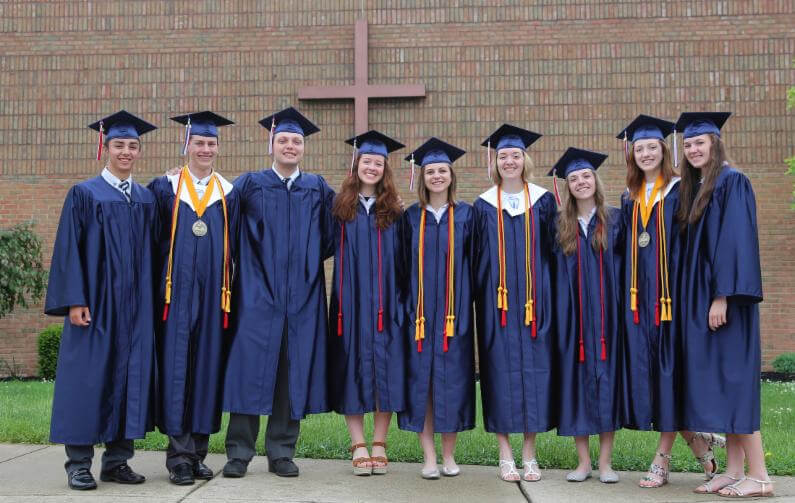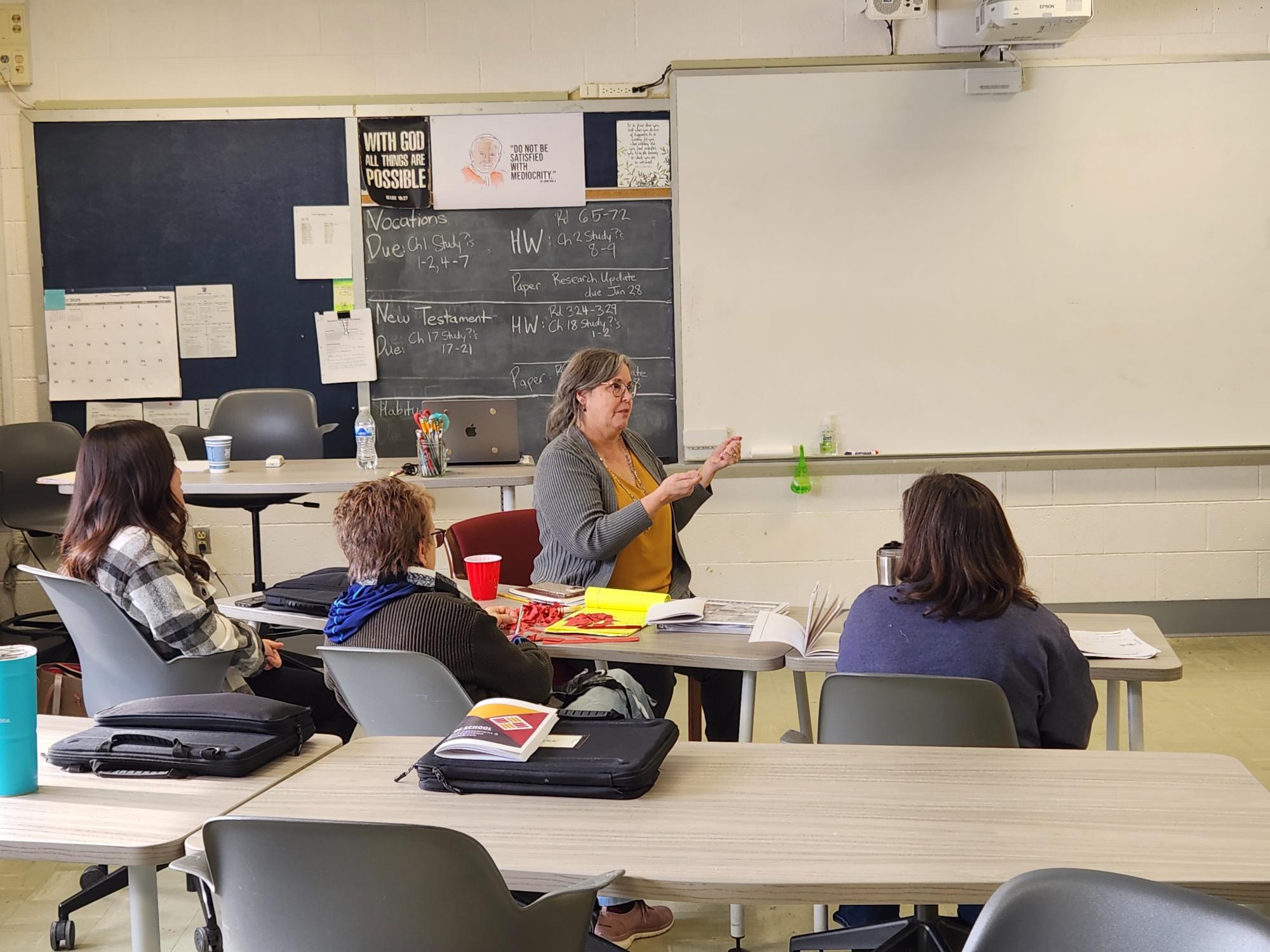Blog


Striving for Authentic Rigor – Being Semper Altius
What Semper Altius Means at Royalmont Academy
If you step into a Royalmont Academy classroom today, you might notice that things look a little different from when you were a student. Gone are the days of rigid, one-size-fits-all teaching, where students passively took notes while the teacher lectured at the front of the room. Today’s best practices in education emphasize active learning, deeper engagement, and intellectual formation that challenges students to think, question, and apply their knowledge.
But rest assured—these shifts are not about change for the sake of change. As a Regnum Christi school, Royalmont Academy is committed to an approach that is highly researched, deeply rooted in Catholic intellectual tradition, and extraordinarily intentional in forming each student as a whole person—mind, heart, and soul.
In January, our faculty dedicated several days to professional development, diving into the key pillars of Regnum Christi Education. One of the foundational topics covered was Authentic Rigor and the principle of Semper Altius—Latin for “Always Higher.” But what does Semper Altius really mean in a Regnum Christi school, and how does it shape the way we approach education?
What Semper Altius Means—and What It Does Not
The phrase Semper Altius represents the pursuit of excellence in all aspects of formation—intellectual, human, spiritual, and apostolic. It calls students and teachers alike to aim higher, not just academically but in character, faith, and leadership.
What It Means:
- Excellence over Perfection – We challenge students to reach beyond their comfort zones, not to demand flawlessness, but to encourage growth.
- Intellectual Formation with Purpose – Rigor isn’t about piling on work. Authentic rigor means teaching students to think critically, solve problems, and engage deeply with their education.
- Virtue and Resilience – True rigor doesn’t break a student’s spirit but helps them develop perseverance, responsibility, and confidence.
- Personalized Challenge – Every student is called to strive for their personal best, meeting high standards with the support needed to achieve them.
What It Does Not Mean:
- Excessive Workloads – Assigning mountains of homework doesn’t equate to rigor. Deep understanding matters more than busywork.
- Fear-Based Learning – We do not promote an environment of stress and intimidation. Instead, we foster a culture of encouragement and disciplined effort.
- One-Size-Fits-All Rigor – Semper Altius isn’t about forcing every student into the same mold but rather helping each one grow to their fullest potential.
Why Authentic Rigor Matters
Authentic rigor is not just a school policy; it is a moral imperative. We strive for high academic standards because education is a formation of the whole person—mind, heart, and soul. This aligns with key educational principles from the United States Conference of Catholic Bishops (USCCB), the Royalmont Academy Graduate Profile, and our accreditation standards.
- USCCB’s Catholic Educational Framework: The USCCB emphasizes that a Catholic education should form “students to be faithful, articulate, and morally responsible citizens”. Authentic rigor ensures that students can think deeply, reason morally, and act justly.
- Graduate Profile Expectations: Royalmont Academy’s graduate profile highlights that our students must be critical thinkers, faith-driven leaders, and resilient learners. Rigor prepares them to excel in college, careers, and their Christian vocations.
- Accreditation Standards: Accreditation criteria for Catholic schools emphasize intellectual rigor balanced with a student-centered approach. Schools are called to set high academic expectations while ensuring student well-being and holistic growth.
For more on Catholic education’s role in forming students, visit the United States Conference of Catholic Bishops‘ Catholic Education page.
Authentic Rigor in Action
During our training, we examined how Authentic Rigor transforms the classroom. It’s about engaging lessons, active learning, and meaningful assessments—not rote memorization or surface-level tasks.
Here’s how this plays out in Royalmont Academy classrooms:
✅ Homework Best Practices – Research and best practices indicate that homework should be purposeful, manageable, and developmentally appropriate. The recommended guidelines are:
- Kindergarten-2nd Grade: 10–20 minutes per night.
- 3rd-5th Grade: 30–50 minutes per night.
- 6th-8th Grade: 60–80 minutes per night.
- High School: 90–120 minutes per night, adjusted for AP/honors courses.
📌 What This Means in Practice: Homework is designed to reinforce key concepts rather than introduce entirely new material. It should foster independent practice, reading, reflection, or preparation for discussions, without overwhelming students.
✅ Classroom Pacing – Faculty members are trained to adjust pacing based on formative assessments and student engagement:
- 20% Direct Instruction: Teachers limit direct lecture time to 20% of the lesson to maximize engagement.
- 40% Guided Practice: Students work collaboratively, discussing, debating, and solving problems together.
- 40% Independent or Applied Learning: Students work on projects, problem-solving exercises, and hands-on activities that connect learning to real-world contexts.
✅ Assessment for Learning – At Royalmont, assessment is not just about tests. We measure student understanding through multiple forms of assessment:
- Socratic Seminars to evaluate critical thinking and communication skills.
- Project-Based Learning to encourage real-world problem-solving.
- Formative Quizzes that guide instruction rather than penalize students.
- Traditional Tests used strategically rather than as the sole measure of learning.
✅ Guided Struggle – Learning is not always easy, nor should it be. Faculty are trained to support productive struggle, allowing students to wrestle with difficult problems before intervening, ensuring they build resilience and independent thinking skills.
✅ Virtue-Based Learning – Since true rigor includes human formation, students are held to high expectations in their character, leadership, and ethical decision-making, not just their academic performance.
At Royalmont, this approach ensures that students not only master academic content but also develop resilience, independence, and a strong moral foundation.
Why This Matters for Your Child
As parents, you play a crucial role in your child’s education. Understanding our commitment to Semper Altius and Authentic Rigor helps you see how we shape well-rounded, faith-filled students prepared for life’s challenges. When you hear your child describe a challenging assignment, know that rigor at Royalmont is designed to foster growth, not frustration. If you ever have questions about how we approach rigor in the classroom, we welcome your conversations.
Join Us in the Journey
At Royalmont Academy, we believe in forming students who will strive for excellence in faith, character, and intellect. Our commitment to Semper Altius means we will always seek ways to improve, innovate, and elevate the learning experience. We invite you to partner with us in this mission!
If you want to learn more about how our unique approach shapes student success, we encourage you to schedule a visit . Together, we can ensure that every student at Royalmont is growing—always higher!
Join the Royalmont Academy Family
Imagine a school where students are known, formed, and prepared to lead — not just for college, but for life. At Royalmont Academy, we nurture academic excellence, leadership, and faith at every stage, from preschool through high school. Request information, schedule a visit, or begin your journey with us today.